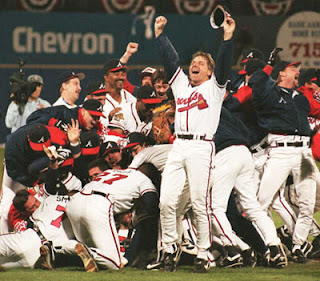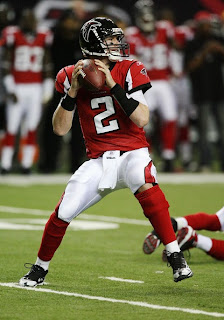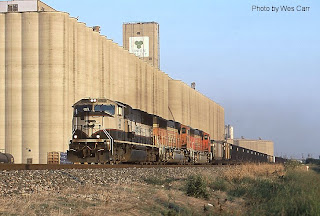I grew up in Saginaw, Texas, a town whose only claim to something better than obscurity is its massive grain elevators - some of the biggest ever built, because this is Texas after all, and even small towns here need the biggest something to prove the Texas bravado. Anyway. I grew up in Texas.
Two sports existed in our household: football and baseball. Nothing else counted. Basketball is played by a bunch of “wannabe-gangster-thug-rappers,” or so my dad said. Hockey is just plain boring, unless Coach Bombay is there telling us all about the triple-deke, the flying V and quacking.
My dad, a man I admire more and more as I get older, was a fan of the Dallas Cowboys and the Texas Rangers. We never went to Cowboys games, but I remember the Ballpark at Arlington, in all its beautiful, green, majestic glory. I, however, wasn’t a Cowboys fan, or a Rangers fan.
 I was a Green Bay Packers fan and an Atlanta Braves fan. The Braves make sense; I spent summers in Georgia with my grandparents and when Grandpa went to bed, Grandma and I would stay up late and watch the Braves. Grandma would scream and scream at Chipper, Glavine, Maddux and Smoltz. Mostly Chipper, and often so loud I was afraid Grandpa would wake up and tell us to go to bed. I liked Green Bay because I was weird and also, one time they won a Super Bowl while I happened to be watching.
I was a Green Bay Packers fan and an Atlanta Braves fan. The Braves make sense; I spent summers in Georgia with my grandparents and when Grandpa went to bed, Grandma and I would stay up late and watch the Braves. Grandma would scream and scream at Chipper, Glavine, Maddux and Smoltz. Mostly Chipper, and often so loud I was afraid Grandpa would wake up and tell us to go to bed. I liked Green Bay because I was weird and also, one time they won a Super Bowl while I happened to be watching.But my dad was a die-hard fan of Texas teams. Sundays in the fall meant the Cowboys were on. Summers meant talking about Rangers baseball.
So it struck me as really odd when, after a move to Georgia, my dad began rooting for the Falcons and the Braves. I understood the Braves because they’re awesome, but at the time, the Falcons were even worse than the Cowboys. I asked dad what was up with this sudden change of heart; he said something along the lines of, “We live in Georgia now,” and I probably made some crack about him needing to learn the meaning of loyalty.
As I get older though, I view that response differently. My dad, a former minister, was doing something that I now realize had an importance all its own: he was trying to relate to his new neighbors, new friends and a new church community. He was, to quote Paul, “becoming all things to all people.” That may sound weird; all he did was change his allegiance to sports teams.
 Big deal, who cares? But looking back, I can see how the people he met cared. He could converse with them about a subject that they both knew something about. No one in Georgia cared about the Rangers, or the Packers, or the majestic grain elevators of Saginaw, Texas. But they did care about the Falcons and most definitely the Braves.
Big deal, who cares? But looking back, I can see how the people he met cared. He could converse with them about a subject that they both knew something about. No one in Georgia cared about the Rangers, or the Packers, or the majestic grain elevators of Saginaw, Texas. But they did care about the Falcons and most definitely the Braves.My dad had this whole idea of understanding a new culture and building relationships that bridged the gap. He could relate to people in this new environment on a level that I simply couldn’t because I was stubbornly sticking to my Brett Favre (pre-Jets) loving ways. He could connect and build relationships whereas I was still an outsider. And from him, I learned the importance of culture and relationship building before it became the trend du jour. (Hey! My dad’s a Christian Hipster!)
He was acting out the all things to all people that Paul was talking about. And while I don’t think Paul was envisioning sports fandom exactly, still, it works. Especially in a society where our sports affiliation is seen as a key to our identity.
So yeah, my dad wasn’t loyal to the Cowboys or the Rangers. He’s not even really loyal to the Falcons or the Braves. But he’s loyal to God and to people. And sometimes, that means giving up things we desire in the pursuit of connecting with others.
Ian is the Youth and Family Minister at the Lakehoma Church of Christ in Mustang, Oklahoma. You can follow him on Twitter @KindaScottish.
You can follow On Pop Theology on Twitter @OnPopTheology or like us on Facebook at www.facebook.com/OnPopTheology.
You might also like:
- Kentucky Football and God
- Opening Day: The Spectacle of Sport as Religious Festival
- The Championship Myth


No comments:
Post a Comment